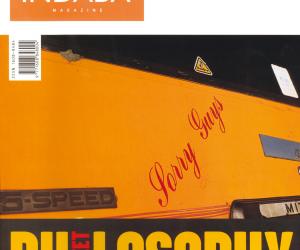First Published in

No wonder then that to the uninitiated, the prospect of riding a taxi can be daunting. During rush hour in any South African city, taxis move to commandeer the streets with horns blaring, transporting the workforce to and from their daily grind, all the while leaving in their wake high-strung and bewildered fellow motorists on the verge of road rage.
Taxis have been negatively profiled in the media constantly as a result of the violence that has rocked the industry over the years as well as the driving habits that we have grown to know and love. But love them or hate them, taxis provide a service that is crucial to the operation of cities and towns nationwide. Effectively the most reliable mode of public transport in the country, they literally keep South Africa moving. In addition, though often underplayed, their influence on popular culture and its influence on them is substantial.
The taxi industry has brought into being a unique media space. Every major brand from Vodacom through Love Life condoms to Iwisa maize meal uses these mobile billboards to bombard public consciousness with their 'latest and greatest.' The industry has also played a role in sparking a highly developed system of sign language that has been acknowledged in commercial messsaging such as the Coca-Cola advertising campaigns (for regular riders, a few strategically configured fingers in the air communicate their request to board as well as their desired destination.)
Above and beyond commerce however, this space is also used to good effect in the quest to communicate personal ideas and perspectives - it becomes a message board of sorts. Submerged in the commercialisation of their vehicles, taxi drivers go out of their way to add their personal touch, in the process branding themselves and their taxis and blessing fellow motorists with insightful 'words of wisdom.'
There is an obvious logic to many of the slogans. For example, "when days are dark, friends are few" is a provocative phrase that turns a simple drive to the mall into an introspective examination of the value and meaning of true friendship. Others, however, have a more obscure meaning - one that is intelligible only in the depths of the driver's own mind.
In this creative process, taxi drivers exercise poetic license to express and share their personal take on the world. The "Red Devil" on a red 'Zola Budd'* is rational enough but "Tell Me Why" will have you musing "why what?" Monologue becomes dialogue as passengers and fellow motorists engage with and attempt to decipher what I call the 'street philosophy' of the highways and byways of South Africa. How about "the red lady", "pride of family", "D'jango is back", "just another poor boy", "something different", "choosy lover", "the punch", "don't try me, try Jesus."
The owner of "Broken heart" must have experienced a bad break-up around the time the taxi was being prepared for the streets. Confronted with this gem, one can only hope that the situation was rectified because there is nothing worse than riding with, or driving behind an angry taxi driver in South Africa. "Wrongfully accused" is a worrying one. Traffic ticket? Something worse?
Taxis are cutting edge, playing the latest in music through woofers that project heavy beats and rhythms to all in their vicinity and beyond, entertaining passengers in party mode and deafening the rest. The influence of music on street philosophy is especially strong and gangsta rap icons and phrases appear everywhere. The East Coast / West Coast 'beef' that plagued the US hip hop industry and possibly resulted in the deaths of Tupac Shakur and the Notorious B.I.G., has been imported into our society along with the CDs it would seem. Still popular five years after his death, Shakur's image, words and thoughts are exhibited on many a taxi.
At the same time, local still proves 'lekker' with the "Makoya One" (as in 'real McCoy') cruising the streets blaring the latest from SA Kwaito star Mandoza and keeping school kids in the back seat entertained.
The language used on these vehicles is quite an accurate barometer of what's 'hot' in popular culture, reflecting what's happening in society, particularly in music, film and sport. And the creativity evident in adding that 'personal touch' invalidates stereotypes of the industry, or at least challenges us to consider the possibility of an alternative characterisation of those that operate in it.
Wisdom and knowledge take different forms and spread in different ways. One can gain the most amazing insights from the most unlikely sources. Street philosophy is an expression of the thoughts and perceptions of a particular sector of South African society that is, more often than not, viewed with an element of negativity. A sector whose place in society allows them special insights into and expressions of a colourful parallel world that many will never experience firsthand.
Street philosophy is their way of making their presence felt.
*Taxis are often affectionately known as Zola Budd after the South African athletics legend of the mid-eighties.







